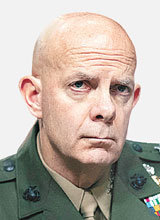Large scale joint exercises should be resumed, says U.S. commander
Large scale joint exercises should be resumed, says U.S. commander
Posted February. 10, 2022 07:54,
Updated February. 10, 2022 07:54

A commandant of the U.S. Marine Corps said large-scale ROK-U.S. joint military drills, which have been practically suspended since 2019, should be resumed. The joint military drills have been replaced with computer-simulated command post exercise (CPX) following the 2018 U.S.-North Korea Singapore Summit, conducting small-scale exercises without field training exercises (FTX).
According to the Radio Free Asia (RFA), U.S. Marine Corps commandant David H. Berger said at an online meeting hosted by the National Defense Industry Association (NDIA) on Tuesday (local time), that he supports the resumption of ROK-U.S. large-scale joint military exercises, adding through the exercises, they need to show the enemy that armed forces of South Korea and the U.S. are capable of real combat.
Commandant Berger pointed out that multiple small-scale exercises cannot be effective as large-scale exercises. He said it is worth conducting small-scale exercises as they carry out drills that commanders of lower-level tactical units need to focus on, but higher-level commanders need to repeat large-scale FTX. He added that grouping five small-scale exercises into one does not mean it can replace a large-scale exercise.
As for computer-simulated exercises, Berger sarcastically said PowerPoint is not credible deterrence, stressing that effective deterrence is real exercises that can actually show the enemy what we are capable of.
Concerns have been raised about the weakening of military readiness against North Korea as ROK-U.S. joint military exercises have been scaled back under the Moon Jae-in administration and are being carried out in the form of a war-game model. As the ROK-U.S. joint military drills scheduled for next month has been reportedly postponed to the second week of April, there would likely be a setback in the schedule of a full operation capability (FO) assessment of the future Combined Forces Command, which is a condition for the transfer of wartime operational control.
abro@donga.com







